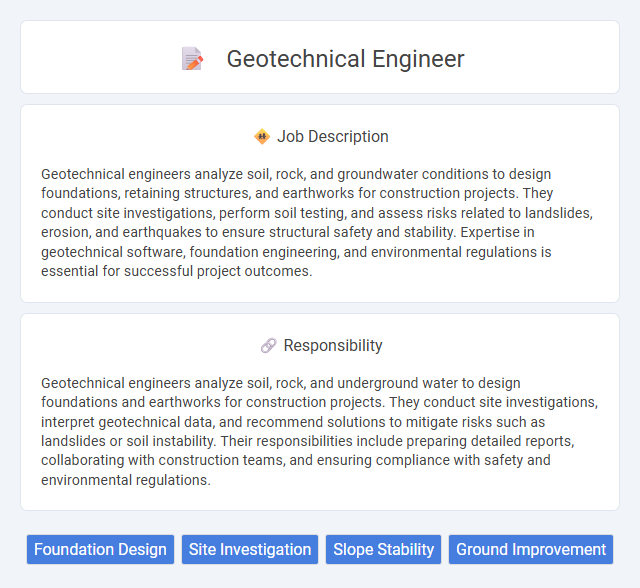
Geotechnical engineers analyze soil, rock, and groundwater conditions to design foundations, retaining structures, and earthworks for construction projects. They conduct site investigations, perform soil testing, and assess risks related to landslides, erosion, and earthquakes to ensure structural safety and stability. Expertise in geotechnical software, foundation engineering, and environmental regulations is essential for successful project outcomes.
People with a strong interest in soil mechanics, construction processes, and problem-solving may find a geotechnical engineer role suitable. Those comfortable working in outdoor environments and handling complex data analysis might have a higher probability of success in this career. Individuals who prefer routine office tasks without fieldwork might find the job less fitting for their preferences.
Qualification
A Geotechnical Engineer typically requires a bachelor's degree in civil engineering, geotechnical engineering, or a related field, with many employers preferring a master's degree for advanced roles. Professional licensure such as the PE (Professional Engineer) certification is essential for practice and demonstrates expertise in soil mechanics, foundation design, and earthworks. Strong analytical skills, proficiency in geotechnical software, and experience with site investigations and lab testing are critical qualifications for success in this role.
Responsibility
Geotechnical engineers analyze soil, rock, and underground water to design foundations and earthworks for construction projects. They conduct site investigations, interpret geotechnical data, and recommend solutions to mitigate risks such as landslides or soil instability. Their responsibilities include preparing detailed reports, collaborating with construction teams, and ensuring compliance with safety and environmental regulations.
Benefit
A Geotechnical Engineer likely offers significant benefits in project safety by assessing soil stability and mitigating risks of structural failure. Their expertise probably enhances cost-efficiency through accurate soil analysis, reducing unforeseen foundation problems. Employing such professionals may also improve environmental compliance during construction projects.
Challenge
Geotechnical engineers likely face complex challenges involving soil behavior and foundation design under uncertain conditions. Addressing issues such as slope stability, ground settlement, and soil-structure interaction often requires innovative problem-solving and risk assessment. These challenges may demand advanced analytical techniques and interdisciplinary collaboration to ensure safe and sustainable construction projects.
Career Advancement
Geotechnical engineers specializing in subsurface analysis and foundation design can accelerate career advancement by obtaining professional licensure such as the PE (Professional Engineer) certification. Gaining expertise in advanced technologies like ground-penetrating radar and finite element analysis enhances project leadership opportunities. Pursuing roles in project management or consultancy often leads to higher responsibility and salary growth within civil engineering firms.
Key Terms
Foundation Design
Geotechnical Engineers specializing in foundation design analyze soil properties and ground conditions to create safe and cost-effective foundation systems for structures, ensuring stability and load-bearing capacity. They employ advanced techniques such as soil sampling, site investigation, and finite element modeling to recommend appropriate foundation types, including shallow foundations, deep foundations, and pile foundations. Expertise in mitigating risks like soil settlement, bearing capacity failure, and groundwater influence is crucial for optimizing foundation performance in diverse construction projects.
Site Investigation
Geotechnical engineers specialize in site investigation to assess soil, rock, and groundwater conditions essential for safe and cost-effective construction projects. They conduct subsurface explorations using drilling, sampling, and in-situ testing techniques to gather critical data for foundation design and slope stability analysis. Detailed geotechnical reports from these investigations guide engineers and contractors in mitigating risks related to soil behavior and ground movement.
Slope Stability
Geotechnical Engineers specializing in slope stability analyze soil and rock mechanics to prevent landslides and foundation failures in construction projects. They conduct site investigations, perform stability analyses using software models, and design retaining structures or drainage systems to mitigate erosion and slope movement. Expertise in risk assessment and compliance with environmental regulations ensures safe and sustainable development on challenging terrains.
Ground Improvement
Geotechnical engineers specializing in ground improvement utilize advanced techniques such as soil stabilization, grouting, and deep soil mixing to enhance soil properties and ensure foundation stability. Their expertise is critical in mitigating risks related to soil liquefaction, settlement, and bearing capacity in construction projects. This role demands proficiency in site investigation, soil mechanics, and the design of ground improvement systems tailored for infrastructure resilience.
 kuljobs.com
kuljobs.com